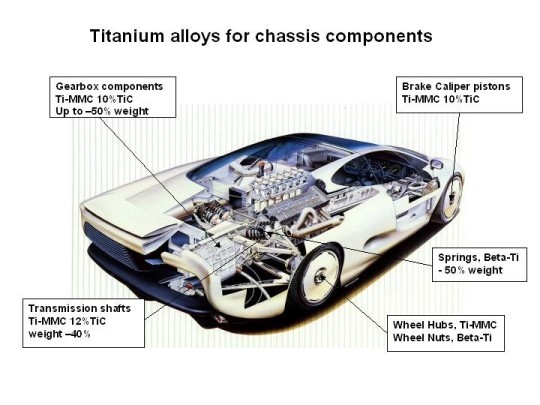
Titanium for Automotive chassis applications
Although Titanium alloys are from great interest for many Chassis application the high price is the major hurdle for a widespread use. New Titanium production processes could use significantly less expensive raw materials will help to reduce Titanium price dramatically. Currently used Kroll-Process is energy and time consumptive but produces Titanium alloys with excellent quality for all type of applications including Aerospace. For this reason all the supply chain is targeted on quality and not on low cost. For Steelmaking other less expensive processing routes are well developed. This is another reason for the large price gap between Steel and Titanium.
Currently Titanium is used mainly for three different Chassis application like Springs, Exhaust systems and wheel nuts/lugs.
Chassis Springs
Titanium chassis springs have a number of advantages. They are up to 60% lighter than their Steel competitors. They need less coils and so they are shorter in height. This is very attractive for the Chassis designer to save space. Titanium springs are very corrosion resistant and do not need protective coating. Corrosion is one of the major reasons for spring failure. However Titanium springs are more expensive than Steel ones. They are in use for ultra low fuel consumption, high performance and race cars. But they are also attractive for new electro cars. They are very limited in space at the wheel hub and weight critical. For luxury cars the use of Titanium springs is questionable because they are usually featured with air springs.
AMT was the first company who has introduced Titanium springs for street cars in Europe. For these springs a new generation of Beta-Titanium with lower cost were used. These Beta-Titanium alloys are easy to cold roll and require a simple heat treatment.
AMT can supply Titanium springs made of the latest most high performance Beta-Titanium alloys. We design and calculate springs with the designing program HEXAGON. This program generates also a manufacturing drawing for the spring production.
Exhaust Systems
Titanium is used for exhaust system quite for a while. Usually Titanium Grade-2 is used. But ti-Grade2 as neither sufficient strength nor oxidation resistance for high temperature use. So these exhaust systems needs to be replaced after a while. New high temperature Titanium alloys for exhaust systems show better strength and oxidation resistance but are also limited to about 450°C for continuous service.
AMT can now offer new high temperature and intermetallic Titanium alloys that could be used up to 900°C. Because of the cost of the intermetallic alloys, they are targeted now only for racing. We have for this application TiAl, Ti2AlNb and Ti3Al intermetallic Titanium alloys available.
For standard application our Ti-SF60 is the first choice for temperatures up to 610°C. Exhaust systems made of Titanium are about 50-60% lighter than the Stainless Steel competitors. Ti-Exhaust systems are very corrosion resistant.



